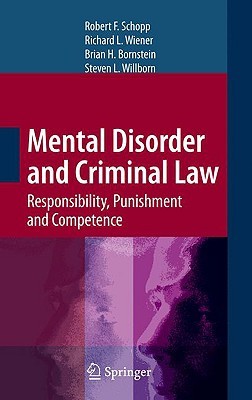
- Liko vos keli vienetai
- Leidėjas: Springer
- ISBN-10: 0387848444
- ISBN-13: 9780387848440
- Formatas: 15.6 x 23.4 x 1.6 cm, kieti viršeliai
- Kalba: Anglų
- Extra -15 % nuolaida šiai knygai su kodu: ENG15
Mental Disorder and Criminal Law (el. knyga) (skaityta knyga) | knygos.lt
Atsiliepimai
Aprašymas
Robert F. Schopp Recent Supreme Court decisions categorically preclude the application of capital punishment to convicted offenders who were below the age of eighteen or mentally 1 retarded at the time they committed the crimes for which they were sentenced. Neither opinion suggests that offenders in these categories cannot be criminally responsible for their offenses, and the Atkins opinion explicitly recognizes that some mentally 2 retarded offenders can qualify as criminally responsible for their offenses. In each case, part of the reasoning in support of the exemption from capital sentences purports to show that capital punishment of these offenders would serve neither the retributive 3 nor the deterrent functions of criminal punishment. Both opinions focus substantial attention on the retributive rationale, contending that these offenders lack sufficient 4 culpability, blameworthiness, or depravity to merit capital punishment. The opinions recognize that a categorical bar for all offenders below a specified age or level of intelligence might exempt some individuals who do not lack culpability sufficient to justify capital sentences. The opinions draw categorical rules, however, to avoid the risk that some individuals who lack sufficient culpability to deserve capital punish- 5 ment will be misidentified as sufficiently culpable to merit capital sentences. The dissenting opinions in each case recognize that offenders in these categories have limitations that render them less culpable on average than unimpaired offenders who commit similar crimes.
EXTRA 15 % nuolaida su kodu: ENG15
Akcija baigiasi už 15d.08:23:51
Nuolaidos kodas galioja perkant nuo 10 €. Nuolaidos nesumuojamos.

- Leidėjas: Springer
- ISBN-10: 0387848444
- ISBN-13: 9780387848440
- Formatas: 15.6 x 23.4 x 1.6 cm, kieti viršeliai
- Kalba: Anglų Anglų
Robert F. Schopp Recent Supreme Court decisions categorically preclude the application of capital punishment to convicted offenders who were below the age of eighteen or mentally 1 retarded at the time they committed the crimes for which they were sentenced. Neither opinion suggests that offenders in these categories cannot be criminally responsible for their offenses, and the Atkins opinion explicitly recognizes that some mentally 2 retarded offenders can qualify as criminally responsible for their offenses. In each case, part of the reasoning in support of the exemption from capital sentences purports to show that capital punishment of these offenders would serve neither the retributive 3 nor the deterrent functions of criminal punishment. Both opinions focus substantial attention on the retributive rationale, contending that these offenders lack sufficient 4 culpability, blameworthiness, or depravity to merit capital punishment. The opinions recognize that a categorical bar for all offenders below a specified age or level of intelligence might exempt some individuals who do not lack culpability sufficient to justify capital sentences. The opinions draw categorical rules, however, to avoid the risk that some individuals who lack sufficient culpability to deserve capital punish- 5 ment will be misidentified as sufficiently culpable to merit capital sentences. The dissenting opinions in each case recognize that offenders in these categories have limitations that render them less culpable on average than unimpaired offenders who commit similar crimes.




Atsiliepimai